Entrepreneurship and Business Studies
VerifiedAdded on 2020/09/08
|15
|4772
|48
AI Summary
This assignment delves into various aspects of entrepreneurship research, including theoretical frameworks, empirical studies, and practical applications. It covers topics such as social entrepreneurship, business model innovation, international entrepreneurship, and the impact of entrepreneurship education. The assignment draws from a wide range of sources, including academic journals, books, and online resources, to provide a comprehensive overview of entrepreneurship research. It is an ideal resource for students, researchers, and practitioners looking to deepen their understanding of entrepreneurship and its many facets.
Contribute Materials
Your contribution can guide someone’s learning journey. Share your
documents today.
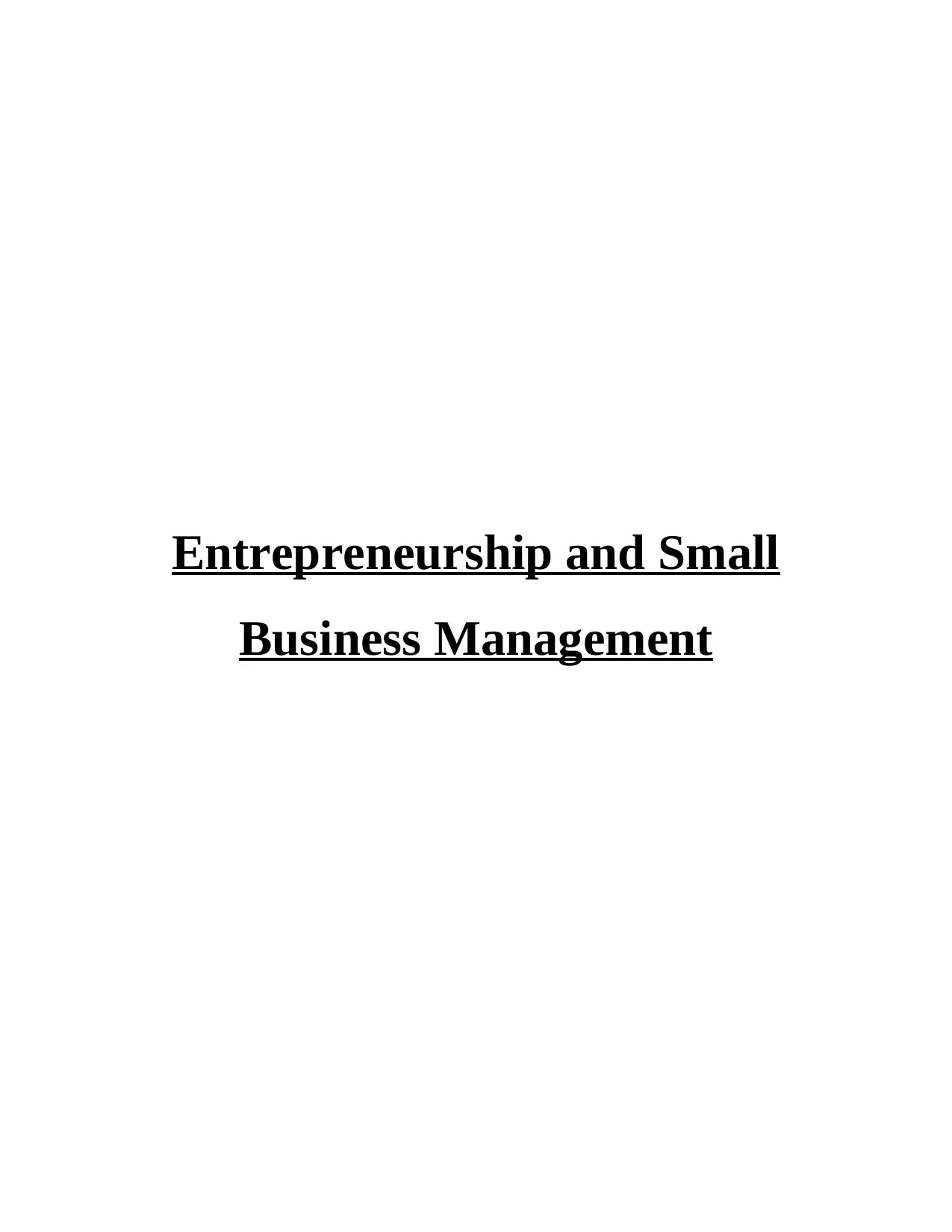
Entrepreneurship and Small
Business Management
Business Management
Secure Best Marks with AI Grader
Need help grading? Try our AI Grader for instant feedback on your assignments.
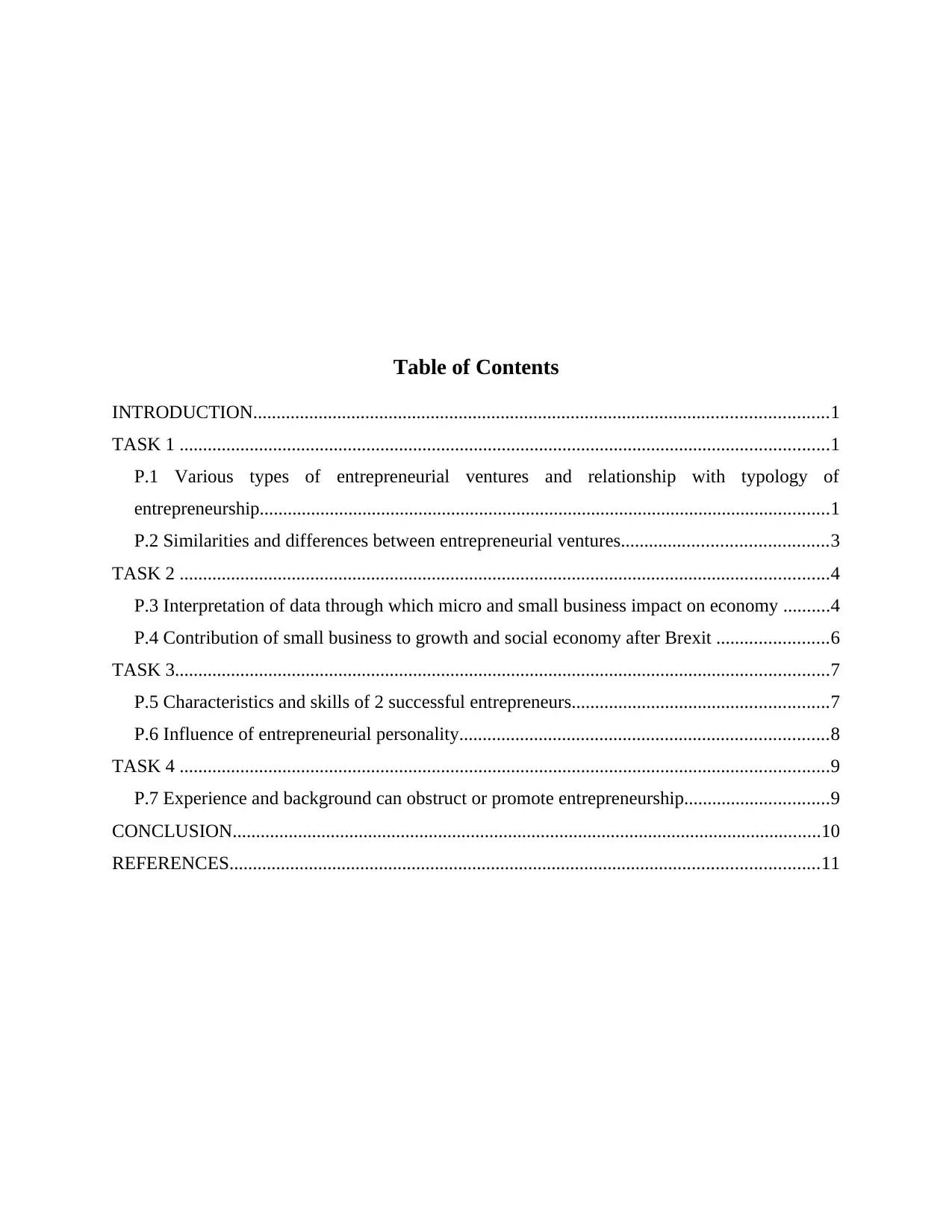
Table of Contents
INTRODUCTION...........................................................................................................................1
TASK 1 ...........................................................................................................................................1
P.1 Various types of entrepreneurial ventures and relationship with typology of
entrepreneurship..........................................................................................................................1
P.2 Similarities and differences between entrepreneurial ventures............................................3
TASK 2 ...........................................................................................................................................4
P.3 Interpretation of data through which micro and small business impact on economy ..........4
P.4 Contribution of small business to growth and social economy after Brexit ........................6
TASK 3............................................................................................................................................7
P.5 Characteristics and skills of 2 successful entrepreneurs.......................................................7
P.6 Influence of entrepreneurial personality...............................................................................8
TASK 4 ...........................................................................................................................................9
P.7 Experience and background can obstruct or promote entrepreneurship...............................9
CONCLUSION..............................................................................................................................10
REFERENCES..............................................................................................................................11
INTRODUCTION...........................................................................................................................1
TASK 1 ...........................................................................................................................................1
P.1 Various types of entrepreneurial ventures and relationship with typology of
entrepreneurship..........................................................................................................................1
P.2 Similarities and differences between entrepreneurial ventures............................................3
TASK 2 ...........................................................................................................................................4
P.3 Interpretation of data through which micro and small business impact on economy ..........4
P.4 Contribution of small business to growth and social economy after Brexit ........................6
TASK 3............................................................................................................................................7
P.5 Characteristics and skills of 2 successful entrepreneurs.......................................................7
P.6 Influence of entrepreneurial personality...............................................................................8
TASK 4 ...........................................................................................................................................9
P.7 Experience and background can obstruct or promote entrepreneurship...............................9
CONCLUSION..............................................................................................................................10
REFERENCES..............................................................................................................................11

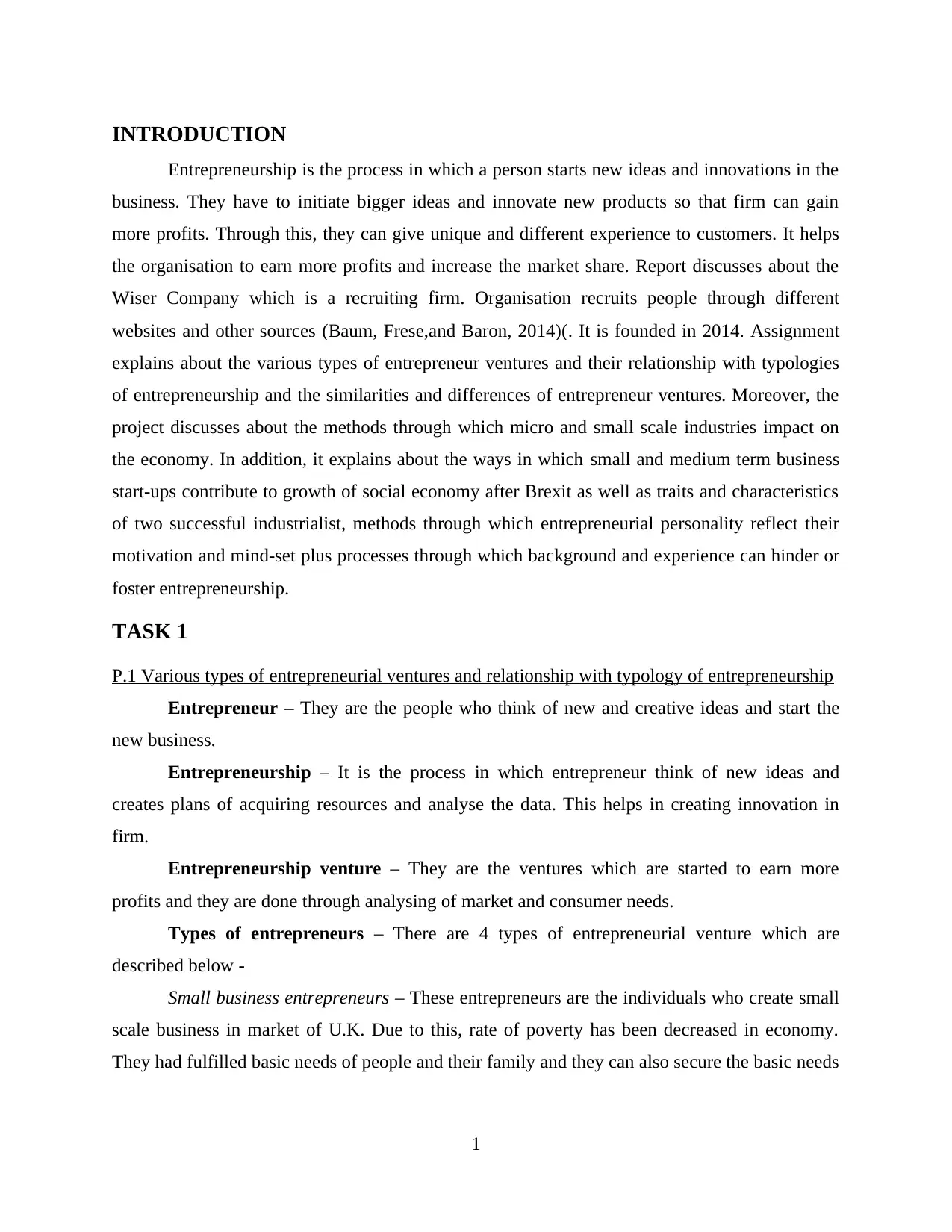
INTRODUCTION
Entrepreneurship is the process in which a person starts new ideas and innovations in the
business. They have to initiate bigger ideas and innovate new products so that firm can gain
more profits. Through this, they can give unique and different experience to customers. It helps
the organisation to earn more profits and increase the market share. Report discusses about the
Wiser Company which is a recruiting firm. Organisation recruits people through different
websites and other sources (Baum, Frese,and Baron, 2014)(. It is founded in 2014. Assignment
explains about the various types of entrepreneur ventures and their relationship with typologies
of entrepreneurship and the similarities and differences of entrepreneur ventures. Moreover, the
project discusses about the methods through which micro and small scale industries impact on
the economy. In addition, it explains about the ways in which small and medium term business
start-ups contribute to growth of social economy after Brexit as well as traits and characteristics
of two successful industrialist, methods through which entrepreneurial personality reflect their
motivation and mind-set plus processes through which background and experience can hinder or
foster entrepreneurship.
TASK 1
P.1 Various types of entrepreneurial ventures and relationship with typology of entrepreneurship
Entrepreneur – They are the people who think of new and creative ideas and start the
new business.
Entrepreneurship – It is the process in which entrepreneur think of new ideas and
creates plans of acquiring resources and analyse the data. This helps in creating innovation in
firm.
Entrepreneurship venture – They are the ventures which are started to earn more
profits and they are done through analysing of market and consumer needs.
Types of entrepreneurs – There are 4 types of entrepreneurial venture which are
described below -
Small business entrepreneurs – These entrepreneurs are the individuals who create small
scale business in market of U.K. Due to this, rate of poverty has been decreased in economy.
They had fulfilled basic needs of people and their family and they can also secure the basic needs
1
Entrepreneurship is the process in which a person starts new ideas and innovations in the
business. They have to initiate bigger ideas and innovate new products so that firm can gain
more profits. Through this, they can give unique and different experience to customers. It helps
the organisation to earn more profits and increase the market share. Report discusses about the
Wiser Company which is a recruiting firm. Organisation recruits people through different
websites and other sources (Baum, Frese,and Baron, 2014)(. It is founded in 2014. Assignment
explains about the various types of entrepreneur ventures and their relationship with typologies
of entrepreneurship and the similarities and differences of entrepreneur ventures. Moreover, the
project discusses about the methods through which micro and small scale industries impact on
the economy. In addition, it explains about the ways in which small and medium term business
start-ups contribute to growth of social economy after Brexit as well as traits and characteristics
of two successful industrialist, methods through which entrepreneurial personality reflect their
motivation and mind-set plus processes through which background and experience can hinder or
foster entrepreneurship.
TASK 1
P.1 Various types of entrepreneurial ventures and relationship with typology of entrepreneurship
Entrepreneur – They are the people who think of new and creative ideas and start the
new business.
Entrepreneurship – It is the process in which entrepreneur think of new ideas and
creates plans of acquiring resources and analyse the data. This helps in creating innovation in
firm.
Entrepreneurship venture – They are the ventures which are started to earn more
profits and they are done through analysing of market and consumer needs.
Types of entrepreneurs – There are 4 types of entrepreneurial venture which are
described below -
Small business entrepreneurs – These entrepreneurs are the individuals who create small
scale business in market of U.K. Due to this, rate of poverty has been decreased in economy.
They had fulfilled basic needs of people and their family and they can also secure the basic needs
1
Secure Best Marks with AI Grader
Need help grading? Try our AI Grader for instant feedback on your assignments.
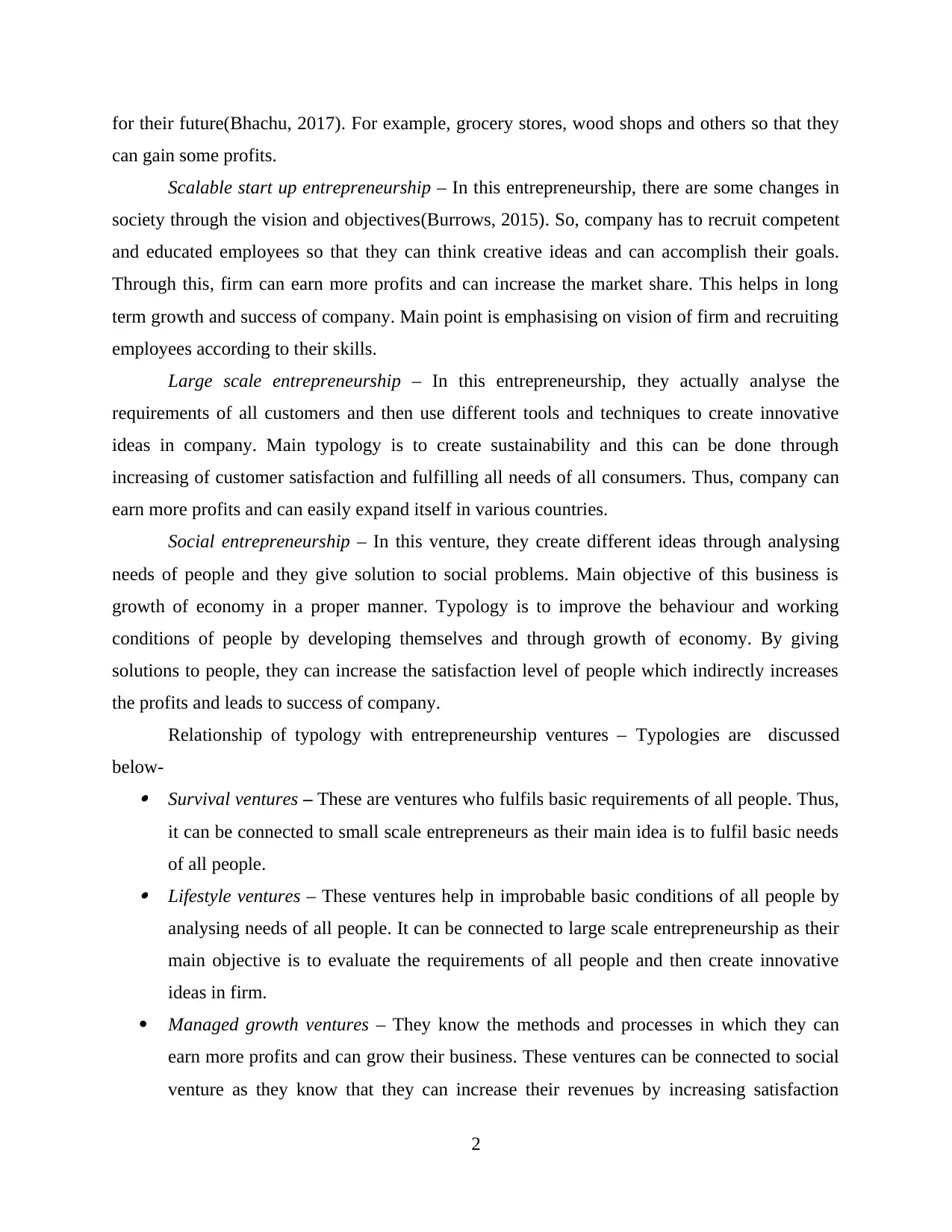
for their future(Bhachu, 2017). For example, grocery stores, wood shops and others so that they
can gain some profits.
Scalable start up entrepreneurship – In this entrepreneurship, there are some changes in
society through the vision and objectives(Burrows, 2015). So, company has to recruit competent
and educated employees so that they can think creative ideas and can accomplish their goals.
Through this, firm can earn more profits and can increase the market share. This helps in long
term growth and success of company. Main point is emphasising on vision of firm and recruiting
employees according to their skills.
Large scale entrepreneurship – In this entrepreneurship, they actually analyse the
requirements of all customers and then use different tools and techniques to create innovative
ideas in company. Main typology is to create sustainability and this can be done through
increasing of customer satisfaction and fulfilling all needs of all consumers. Thus, company can
earn more profits and can easily expand itself in various countries.
Social entrepreneurship – In this venture, they create different ideas through analysing
needs of people and they give solution to social problems. Main objective of this business is
growth of economy in a proper manner. Typology is to improve the behaviour and working
conditions of people by developing themselves and through growth of economy. By giving
solutions to people, they can increase the satisfaction level of people which indirectly increases
the profits and leads to success of company.
Relationship of typology with entrepreneurship ventures – Typologies are discussed
below- Survival ventures – These are ventures who fulfils basic requirements of all people. Thus,
it can be connected to small scale entrepreneurs as their main idea is to fulfil basic needs
of all people. Lifestyle ventures – These ventures help in improbable basic conditions of all people by
analysing needs of all people. It can be connected to large scale entrepreneurship as their
main objective is to evaluate the requirements of all people and then create innovative
ideas in firm.
Managed growth ventures – They know the methods and processes in which they can
earn more profits and can grow their business. These ventures can be connected to social
venture as they know that they can increase their revenues by increasing satisfaction
2
can gain some profits.
Scalable start up entrepreneurship – In this entrepreneurship, there are some changes in
society through the vision and objectives(Burrows, 2015). So, company has to recruit competent
and educated employees so that they can think creative ideas and can accomplish their goals.
Through this, firm can earn more profits and can increase the market share. This helps in long
term growth and success of company. Main point is emphasising on vision of firm and recruiting
employees according to their skills.
Large scale entrepreneurship – In this entrepreneurship, they actually analyse the
requirements of all customers and then use different tools and techniques to create innovative
ideas in company. Main typology is to create sustainability and this can be done through
increasing of customer satisfaction and fulfilling all needs of all consumers. Thus, company can
earn more profits and can easily expand itself in various countries.
Social entrepreneurship – In this venture, they create different ideas through analysing
needs of people and they give solution to social problems. Main objective of this business is
growth of economy in a proper manner. Typology is to improve the behaviour and working
conditions of people by developing themselves and through growth of economy. By giving
solutions to people, they can increase the satisfaction level of people which indirectly increases
the profits and leads to success of company.
Relationship of typology with entrepreneurship ventures – Typologies are discussed
below- Survival ventures – These are ventures who fulfils basic requirements of all people. Thus,
it can be connected to small scale entrepreneurs as their main idea is to fulfil basic needs
of all people. Lifestyle ventures – These ventures help in improbable basic conditions of all people by
analysing needs of all people. It can be connected to large scale entrepreneurship as their
main objective is to evaluate the requirements of all people and then create innovative
ideas in firm.
Managed growth ventures – They know the methods and processes in which they can
earn more profits and can grow their business. These ventures can be connected to social
venture as they know that they can increase their revenues by increasing satisfaction
2
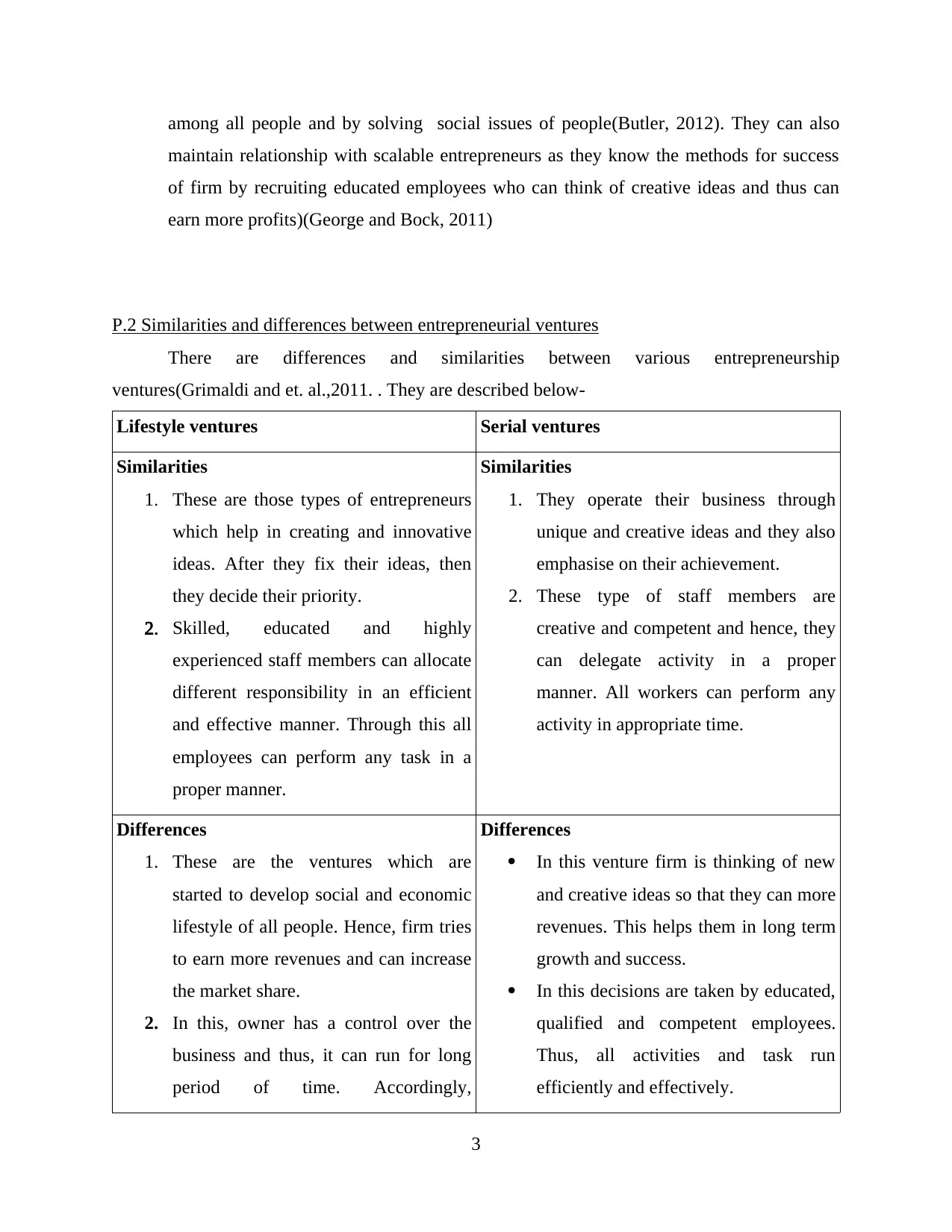
among all people and by solving social issues of people(Butler, 2012). They can also
maintain relationship with scalable entrepreneurs as they know the methods for success
of firm by recruiting educated employees who can think of creative ideas and thus can
earn more profits)(George and Bock, 2011)
P.2 Similarities and differences between entrepreneurial ventures
There are differences and similarities between various entrepreneurship
ventures(Grimaldi and et. al.,2011. . They are described below-
Lifestyle ventures Serial ventures
Similarities
1. These are those types of entrepreneurs
which help in creating and innovative
ideas. After they fix their ideas, then
they decide their priority.
2. Skilled, educated and highly
experienced staff members can allocate
different responsibility in an efficient
and effective manner. Through this all
employees can perform any task in a
proper manner.
Similarities
1. They operate their business through
unique and creative ideas and they also
emphasise on their achievement.
2. These type of staff members are
creative and competent and hence, they
can delegate activity in a proper
manner. All workers can perform any
activity in appropriate time.
Differences
1. These are the ventures which are
started to develop social and economic
lifestyle of all people. Hence, firm tries
to earn more revenues and can increase
the market share.
2. In this, owner has a control over the
business and thus, it can run for long
period of time. Accordingly,
Differences
In this venture firm is thinking of new
and creative ideas so that they can more
revenues. This helps them in long term
growth and success.
In this decisions are taken by educated,
qualified and competent employees.
Thus, all activities and task run
efficiently and effectively.
3
maintain relationship with scalable entrepreneurs as they know the methods for success
of firm by recruiting educated employees who can think of creative ideas and thus can
earn more profits)(George and Bock, 2011)
P.2 Similarities and differences between entrepreneurial ventures
There are differences and similarities between various entrepreneurship
ventures(Grimaldi and et. al.,2011. . They are described below-
Lifestyle ventures Serial ventures
Similarities
1. These are those types of entrepreneurs
which help in creating and innovative
ideas. After they fix their ideas, then
they decide their priority.
2. Skilled, educated and highly
experienced staff members can allocate
different responsibility in an efficient
and effective manner. Through this all
employees can perform any task in a
proper manner.
Similarities
1. They operate their business through
unique and creative ideas and they also
emphasise on their achievement.
2. These type of staff members are
creative and competent and hence, they
can delegate activity in a proper
manner. All workers can perform any
activity in appropriate time.
Differences
1. These are the ventures which are
started to develop social and economic
lifestyle of all people. Hence, firm tries
to earn more revenues and can increase
the market share.
2. In this, owner has a control over the
business and thus, it can run for long
period of time. Accordingly,
Differences
In this venture firm is thinking of new
and creative ideas so that they can more
revenues. This helps them in long term
growth and success.
In this decisions are taken by educated,
qualified and competent employees.
Thus, all activities and task run
efficiently and effectively.
3
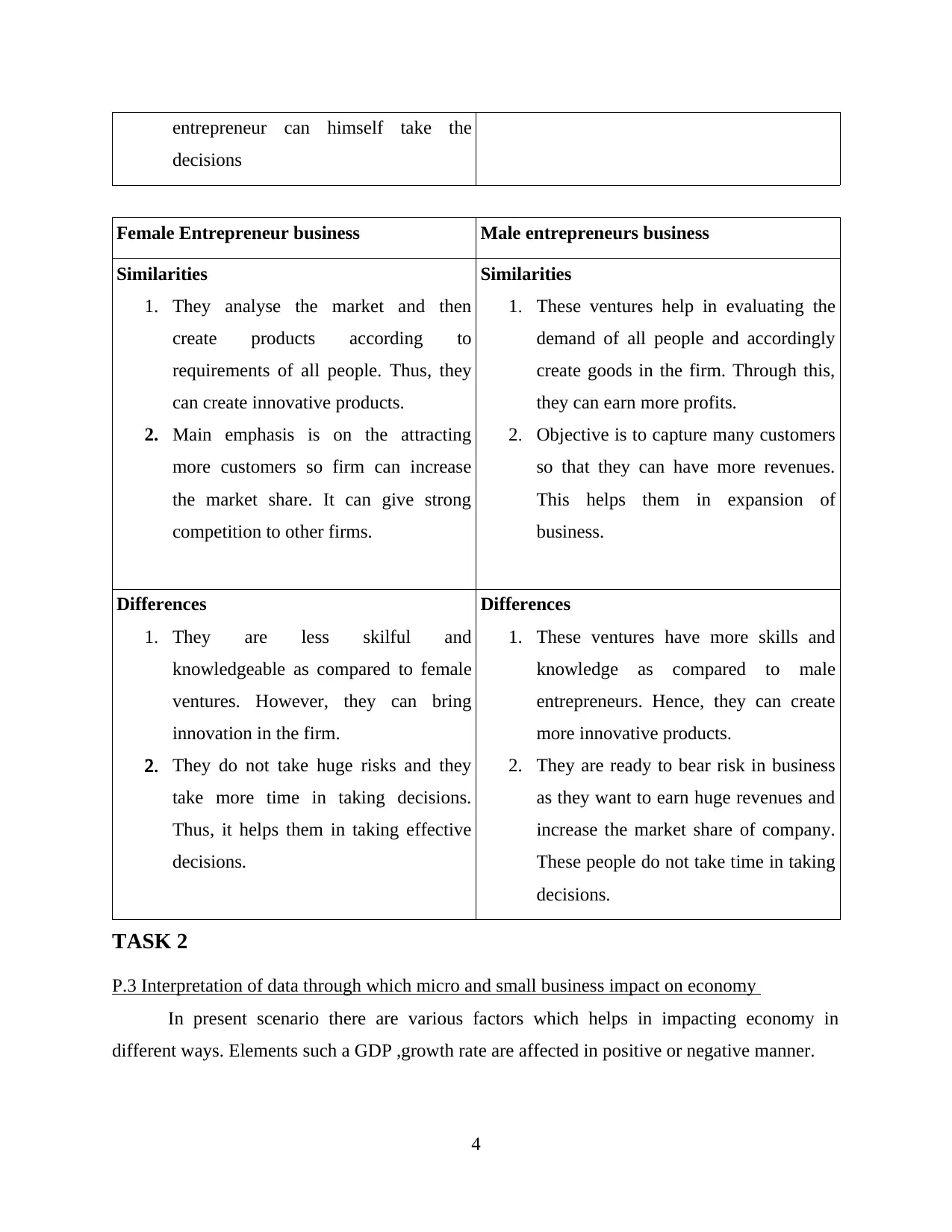
entrepreneur can himself take the
decisions
Female Entrepreneur business Male entrepreneurs business
Similarities
1. They analyse the market and then
create products according to
requirements of all people. Thus, they
can create innovative products.
2. Main emphasis is on the attracting
more customers so firm can increase
the market share. It can give strong
competition to other firms.
Similarities
1. These ventures help in evaluating the
demand of all people and accordingly
create goods in the firm. Through this,
they can earn more profits.
2. Objective is to capture many customers
so that they can have more revenues.
This helps them in expansion of
business.
Differences
1. They are less skilful and
knowledgeable as compared to female
ventures. However, they can bring
innovation in the firm.
2. They do not take huge risks and they
take more time in taking decisions.
Thus, it helps them in taking effective
decisions.
Differences
1. These ventures have more skills and
knowledge as compared to male
entrepreneurs. Hence, they can create
more innovative products.
2. They are ready to bear risk in business
as they want to earn huge revenues and
increase the market share of company.
These people do not take time in taking
decisions.
TASK 2
P.3 Interpretation of data through which micro and small business impact on economy
In present scenario there are various factors which helps in impacting economy in
different ways. Elements such a GDP ,growth rate are affected in positive or negative manner.
4
decisions
Female Entrepreneur business Male entrepreneurs business
Similarities
1. They analyse the market and then
create products according to
requirements of all people. Thus, they
can create innovative products.
2. Main emphasis is on the attracting
more customers so firm can increase
the market share. It can give strong
competition to other firms.
Similarities
1. These ventures help in evaluating the
demand of all people and accordingly
create goods in the firm. Through this,
they can earn more profits.
2. Objective is to capture many customers
so that they can have more revenues.
This helps them in expansion of
business.
Differences
1. They are less skilful and
knowledgeable as compared to female
ventures. However, they can bring
innovation in the firm.
2. They do not take huge risks and they
take more time in taking decisions.
Thus, it helps them in taking effective
decisions.
Differences
1. These ventures have more skills and
knowledge as compared to male
entrepreneurs. Hence, they can create
more innovative products.
2. They are ready to bear risk in business
as they want to earn huge revenues and
increase the market share of company.
These people do not take time in taking
decisions.
TASK 2
P.3 Interpretation of data through which micro and small business impact on economy
In present scenario there are various factors which helps in impacting economy in
different ways. Elements such a GDP ,growth rate are affected in positive or negative manner.
4
Paraphrase This Document
Need a fresh take? Get an instant paraphrase of this document with our AI Paraphraser
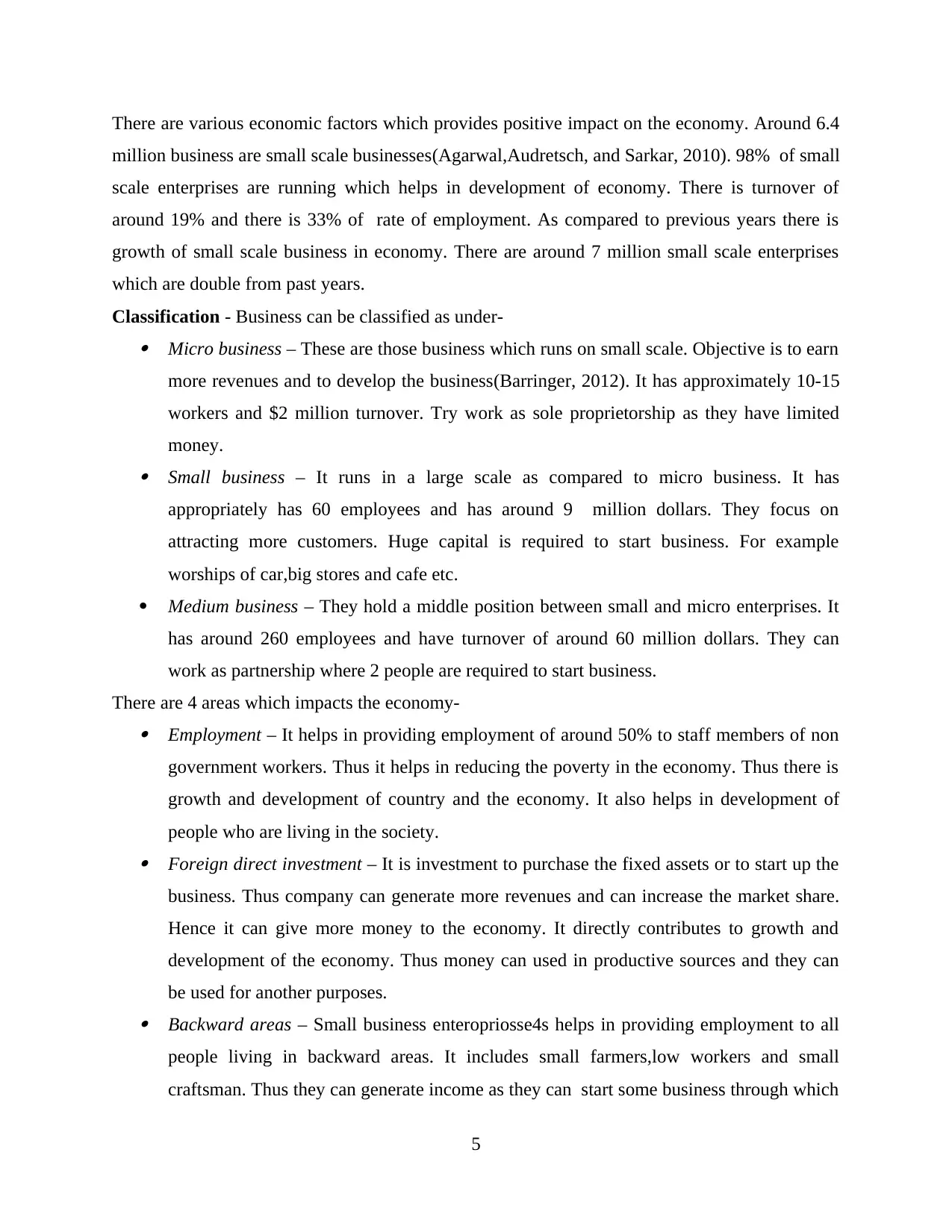
There are various economic factors which provides positive impact on the economy. Around 6.4
million business are small scale businesses(Agarwal,Audretsch, and Sarkar, 2010). 98% of small
scale enterprises are running which helps in development of economy. There is turnover of
around 19% and there is 33% of rate of employment. As compared to previous years there is
growth of small scale business in economy. There are around 7 million small scale enterprises
which are double from past years.
Classification - Business can be classified as under- Micro business – These are those business which runs on small scale. Objective is to earn
more revenues and to develop the business(Barringer, 2012). It has approximately 10-15
workers and $2 million turnover. Try work as sole proprietorship as they have limited
money. Small business – It runs in a large scale as compared to micro business. It has
appropriately has 60 employees and has around 9 million dollars. They focus on
attracting more customers. Huge capital is required to start business. For example
worships of car,big stores and cafe etc.
Medium business – They hold a middle position between small and micro enterprises. It
has around 260 employees and have turnover of around 60 million dollars. They can
work as partnership where 2 people are required to start business.
There are 4 areas which impacts the economy- Employment – It helps in providing employment of around 50% to staff members of non
government workers. Thus it helps in reducing the poverty in the economy. Thus there is
growth and development of country and the economy. It also helps in development of
people who are living in the society. Foreign direct investment – It is investment to purchase the fixed assets or to start up the
business. Thus company can generate more revenues and can increase the market share.
Hence it can give more money to the economy. It directly contributes to growth and
development of the economy. Thus money can used in productive sources and they can
be used for another purposes. Backward areas – Small business enteropriosse4s helps in providing employment to all
people living in backward areas. It includes small farmers,low workers and small
craftsman. Thus they can generate income as they can start some business through which
5
million business are small scale businesses(Agarwal,Audretsch, and Sarkar, 2010). 98% of small
scale enterprises are running which helps in development of economy. There is turnover of
around 19% and there is 33% of rate of employment. As compared to previous years there is
growth of small scale business in economy. There are around 7 million small scale enterprises
which are double from past years.
Classification - Business can be classified as under- Micro business – These are those business which runs on small scale. Objective is to earn
more revenues and to develop the business(Barringer, 2012). It has approximately 10-15
workers and $2 million turnover. Try work as sole proprietorship as they have limited
money. Small business – It runs in a large scale as compared to micro business. It has
appropriately has 60 employees and has around 9 million dollars. They focus on
attracting more customers. Huge capital is required to start business. For example
worships of car,big stores and cafe etc.
Medium business – They hold a middle position between small and micro enterprises. It
has around 260 employees and have turnover of around 60 million dollars. They can
work as partnership where 2 people are required to start business.
There are 4 areas which impacts the economy- Employment – It helps in providing employment of around 50% to staff members of non
government workers. Thus it helps in reducing the poverty in the economy. Thus there is
growth and development of country and the economy. It also helps in development of
people who are living in the society. Foreign direct investment – It is investment to purchase the fixed assets or to start up the
business. Thus company can generate more revenues and can increase the market share.
Hence it can give more money to the economy. It directly contributes to growth and
development of the economy. Thus money can used in productive sources and they can
be used for another purposes. Backward areas – Small business enteropriosse4s helps in providing employment to all
people living in backward areas. It includes small farmers,low workers and small
craftsman. Thus they can generate income as they can start some business through which
5
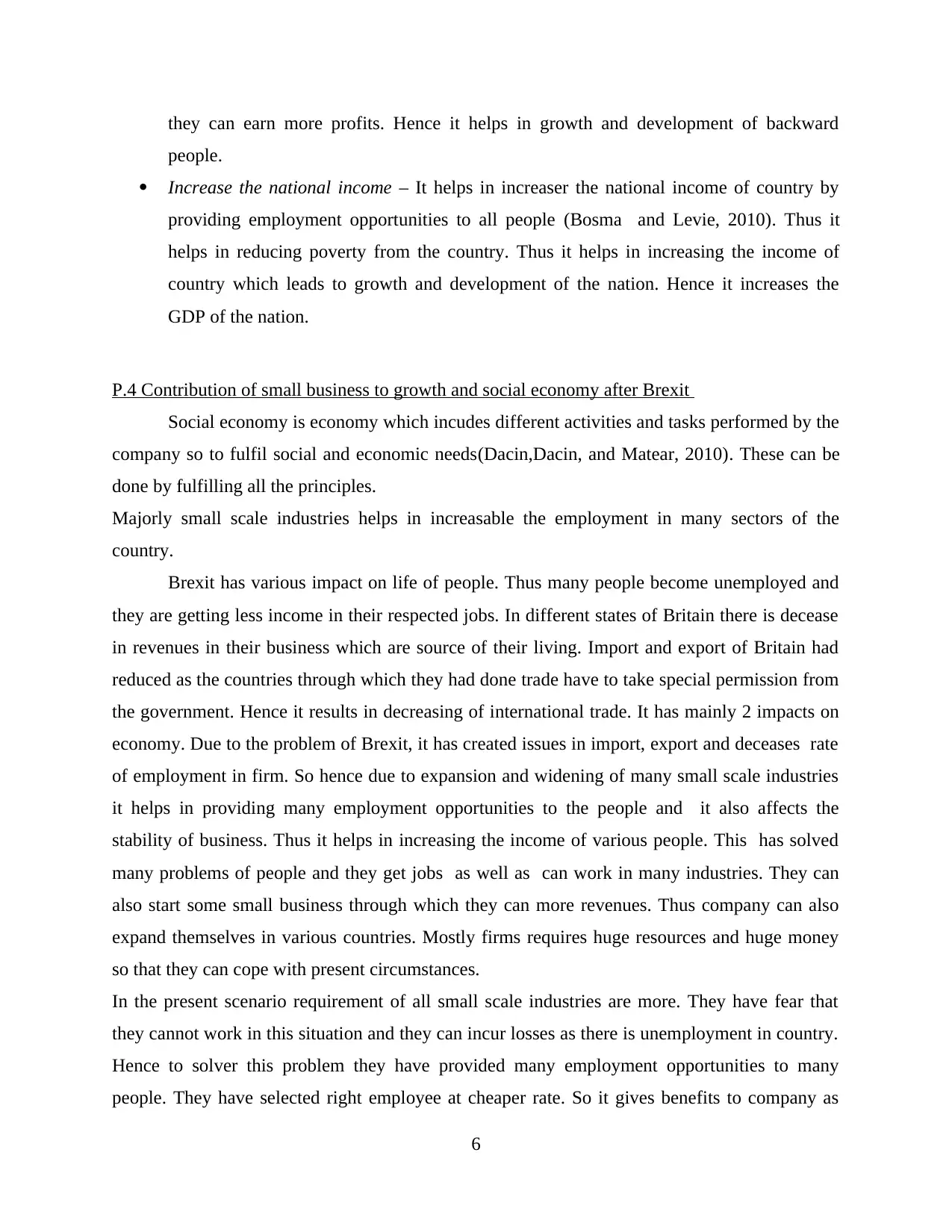
they can earn more profits. Hence it helps in growth and development of backward
people.
Increase the national income – It helps in increaser the national income of country by
providing employment opportunities to all people (Bosma and Levie, 2010). Thus it
helps in reducing poverty from the country. Thus it helps in increasing the income of
country which leads to growth and development of the nation. Hence it increases the
GDP of the nation.
P.4 Contribution of small business to growth and social economy after Brexit
Social economy is economy which incudes different activities and tasks performed by the
company so to fulfil social and economic needs(Dacin,Dacin, and Matear, 2010). These can be
done by fulfilling all the principles.
Majorly small scale industries helps in increasable the employment in many sectors of the
country.
Brexit has various impact on life of people. Thus many people become unemployed and
they are getting less income in their respected jobs. In different states of Britain there is decease
in revenues in their business which are source of their living. Import and export of Britain had
reduced as the countries through which they had done trade have to take special permission from
the government. Hence it results in decreasing of international trade. It has mainly 2 impacts on
economy. Due to the problem of Brexit, it has created issues in import, export and deceases rate
of employment in firm. So hence due to expansion and widening of many small scale industries
it helps in providing many employment opportunities to the people and it also affects the
stability of business. Thus it helps in increasing the income of various people. This has solved
many problems of people and they get jobs as well as can work in many industries. They can
also start some small business through which they can more revenues. Thus company can also
expand themselves in various countries. Mostly firms requires huge resources and huge money
so that they can cope with present circumstances.
In the present scenario requirement of all small scale industries are more. They have fear that
they cannot work in this situation and they can incur losses as there is unemployment in country.
Hence to solver this problem they have provided many employment opportunities to many
people. They have selected right employee at cheaper rate. So it gives benefits to company as
6
people.
Increase the national income – It helps in increaser the national income of country by
providing employment opportunities to all people (Bosma and Levie, 2010). Thus it
helps in reducing poverty from the country. Thus it helps in increasing the income of
country which leads to growth and development of the nation. Hence it increases the
GDP of the nation.
P.4 Contribution of small business to growth and social economy after Brexit
Social economy is economy which incudes different activities and tasks performed by the
company so to fulfil social and economic needs(Dacin,Dacin, and Matear, 2010). These can be
done by fulfilling all the principles.
Majorly small scale industries helps in increasable the employment in many sectors of the
country.
Brexit has various impact on life of people. Thus many people become unemployed and
they are getting less income in their respected jobs. In different states of Britain there is decease
in revenues in their business which are source of their living. Import and export of Britain had
reduced as the countries through which they had done trade have to take special permission from
the government. Hence it results in decreasing of international trade. It has mainly 2 impacts on
economy. Due to the problem of Brexit, it has created issues in import, export and deceases rate
of employment in firm. So hence due to expansion and widening of many small scale industries
it helps in providing many employment opportunities to the people and it also affects the
stability of business. Thus it helps in increasing the income of various people. This has solved
many problems of people and they get jobs as well as can work in many industries. They can
also start some small business through which they can more revenues. Thus company can also
expand themselves in various countries. Mostly firms requires huge resources and huge money
so that they can cope with present circumstances.
In the present scenario requirement of all small scale industries are more. They have fear that
they cannot work in this situation and they can incur losses as there is unemployment in country.
Hence to solver this problem they have provided many employment opportunities to many
people. They have selected right employee at cheaper rate. So it gives benefits to company as
6
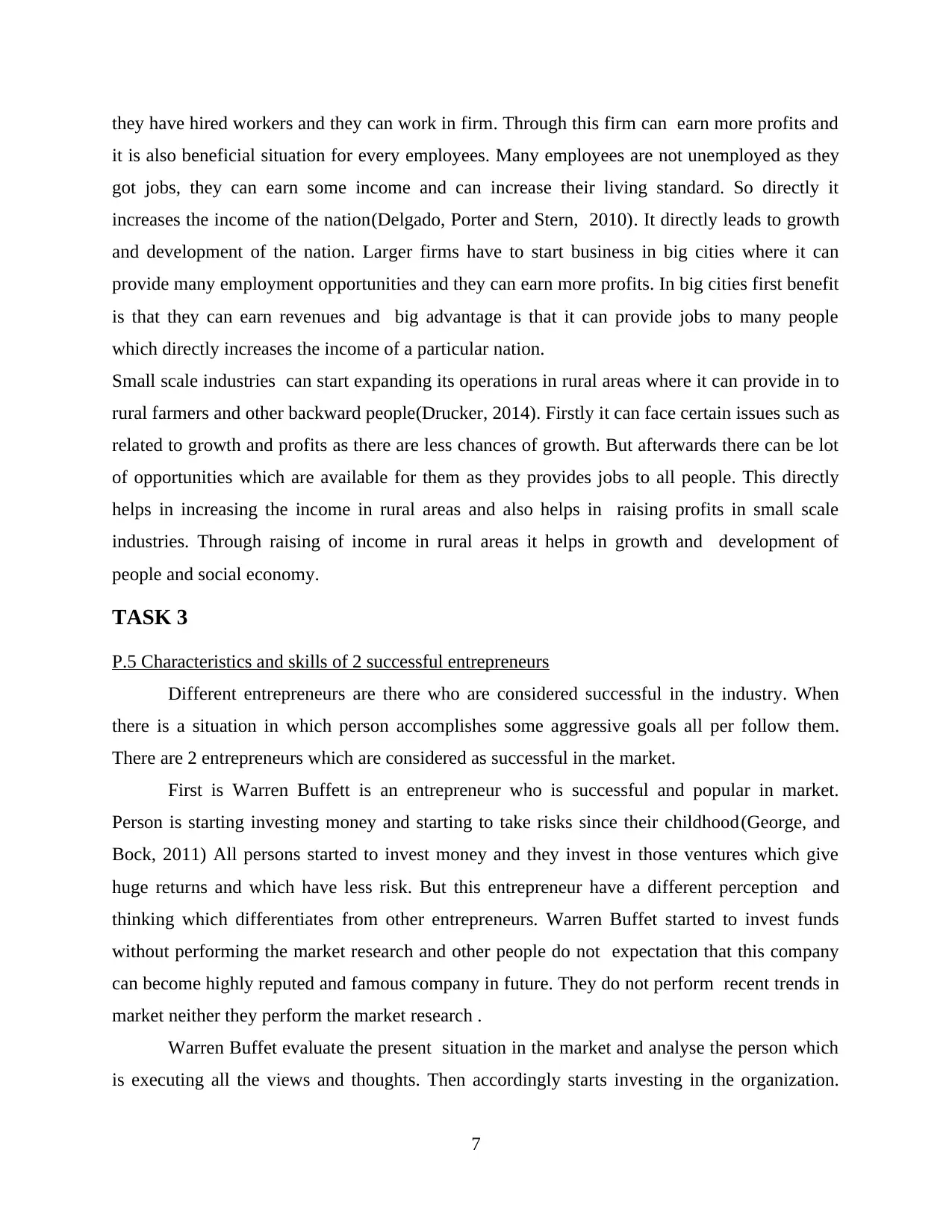
they have hired workers and they can work in firm. Through this firm can earn more profits and
it is also beneficial situation for every employees. Many employees are not unemployed as they
got jobs, they can earn some income and can increase their living standard. So directly it
increases the income of the nation(Delgado, Porter and Stern, 2010). It directly leads to growth
and development of the nation. Larger firms have to start business in big cities where it can
provide many employment opportunities and they can earn more profits. In big cities first benefit
is that they can earn revenues and big advantage is that it can provide jobs to many people
which directly increases the income of a particular nation.
Small scale industries can start expanding its operations in rural areas where it can provide in to
rural farmers and other backward people(Drucker, 2014). Firstly it can face certain issues such as
related to growth and profits as there are less chances of growth. But afterwards there can be lot
of opportunities which are available for them as they provides jobs to all people. This directly
helps in increasing the income in rural areas and also helps in raising profits in small scale
industries. Through raising of income in rural areas it helps in growth and development of
people and social economy.
TASK 3
P.5 Characteristics and skills of 2 successful entrepreneurs
Different entrepreneurs are there who are considered successful in the industry. When
there is a situation in which person accomplishes some aggressive goals all per follow them.
There are 2 entrepreneurs which are considered as successful in the market.
First is Warren Buffett is an entrepreneur who is successful and popular in market.
Person is starting investing money and starting to take risks since their childhood(George, and
Bock, 2011) All persons started to invest money and they invest in those ventures which give
huge returns and which have less risk. But this entrepreneur have a different perception and
thinking which differentiates from other entrepreneurs. Warren Buffet started to invest funds
without performing the market research and other people do not expectation that this company
can become highly reputed and famous company in future. They do not perform recent trends in
market neither they perform the market research .
Warren Buffet evaluate the present situation in the market and analyse the person which
is executing all the views and thoughts. Then accordingly starts investing in the organization.
7
it is also beneficial situation for every employees. Many employees are not unemployed as they
got jobs, they can earn some income and can increase their living standard. So directly it
increases the income of the nation(Delgado, Porter and Stern, 2010). It directly leads to growth
and development of the nation. Larger firms have to start business in big cities where it can
provide many employment opportunities and they can earn more profits. In big cities first benefit
is that they can earn revenues and big advantage is that it can provide jobs to many people
which directly increases the income of a particular nation.
Small scale industries can start expanding its operations in rural areas where it can provide in to
rural farmers and other backward people(Drucker, 2014). Firstly it can face certain issues such as
related to growth and profits as there are less chances of growth. But afterwards there can be lot
of opportunities which are available for them as they provides jobs to all people. This directly
helps in increasing the income in rural areas and also helps in raising profits in small scale
industries. Through raising of income in rural areas it helps in growth and development of
people and social economy.
TASK 3
P.5 Characteristics and skills of 2 successful entrepreneurs
Different entrepreneurs are there who are considered successful in the industry. When
there is a situation in which person accomplishes some aggressive goals all per follow them.
There are 2 entrepreneurs which are considered as successful in the market.
First is Warren Buffett is an entrepreneur who is successful and popular in market.
Person is starting investing money and starting to take risks since their childhood(George, and
Bock, 2011) All persons started to invest money and they invest in those ventures which give
huge returns and which have less risk. But this entrepreneur have a different perception and
thinking which differentiates from other entrepreneurs. Warren Buffet started to invest funds
without performing the market research and other people do not expectation that this company
can become highly reputed and famous company in future. They do not perform recent trends in
market neither they perform the market research .
Warren Buffet evaluate the present situation in the market and analyse the person which
is executing all the views and thoughts. Then accordingly starts investing in the organization.
7
Secure Best Marks with AI Grader
Need help grading? Try our AI Grader for instant feedback on your assignments.
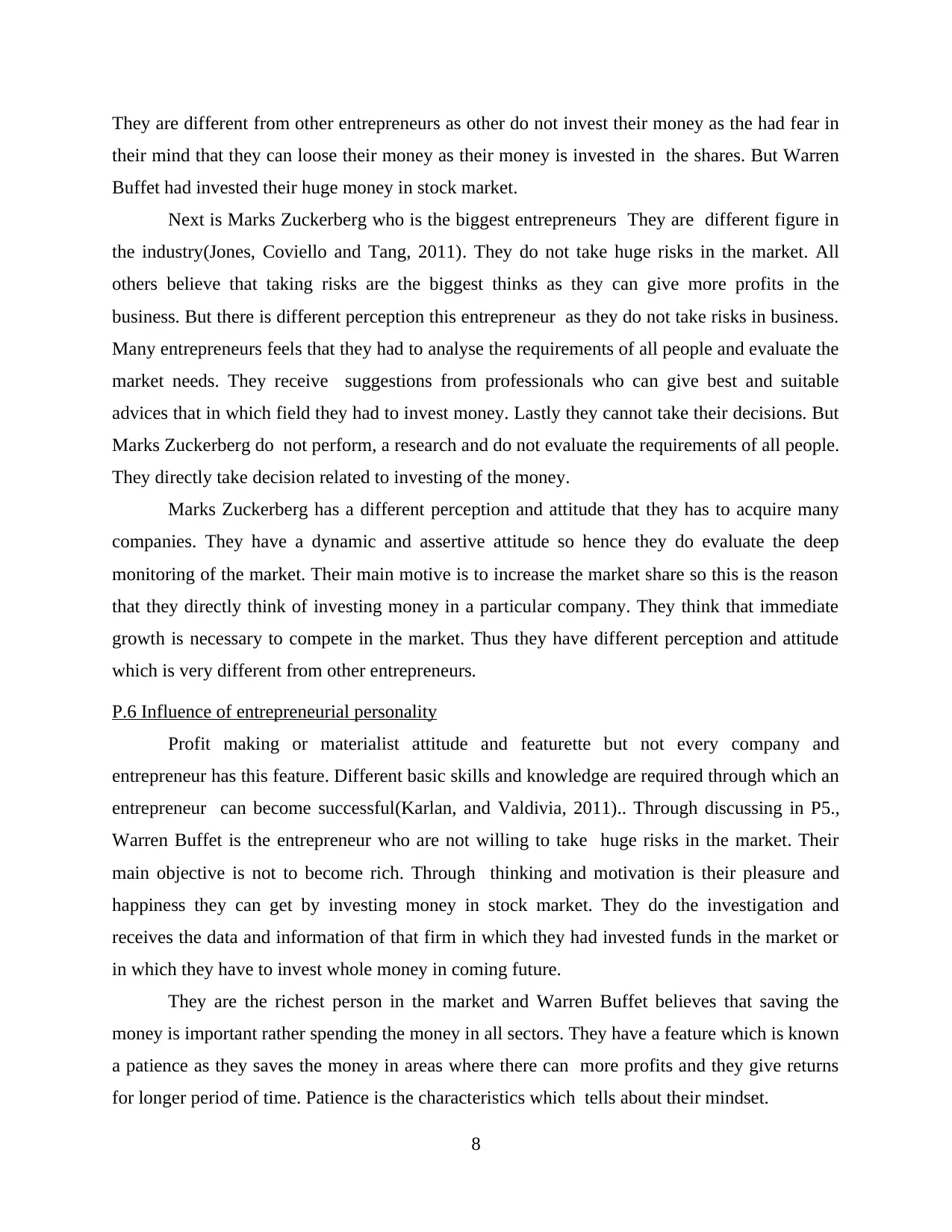
They are different from other entrepreneurs as other do not invest their money as the had fear in
their mind that they can loose their money as their money is invested in the shares. But Warren
Buffet had invested their huge money in stock market.
Next is Marks Zuckerberg who is the biggest entrepreneurs They are different figure in
the industry(Jones, Coviello and Tang, 2011). They do not take huge risks in the market. All
others believe that taking risks are the biggest thinks as they can give more profits in the
business. But there is different perception this entrepreneur as they do not take risks in business.
Many entrepreneurs feels that they had to analyse the requirements of all people and evaluate the
market needs. They receive suggestions from professionals who can give best and suitable
advices that in which field they had to invest money. Lastly they cannot take their decisions. But
Marks Zuckerberg do not perform, a research and do not evaluate the requirements of all people.
They directly take decision related to investing of the money.
Marks Zuckerberg has a different perception and attitude that they has to acquire many
companies. They have a dynamic and assertive attitude so hence they do evaluate the deep
monitoring of the market. Their main motive is to increase the market share so this is the reason
that they directly think of investing money in a particular company. They think that immediate
growth is necessary to compete in the market. Thus they have different perception and attitude
which is very different from other entrepreneurs.
P.6 Influence of entrepreneurial personality
Profit making or materialist attitude and featurette but not every company and
entrepreneur has this feature. Different basic skills and knowledge are required through which an
entrepreneur can become successful(Karlan, and Valdivia, 2011).. Through discussing in P5.,
Warren Buffet is the entrepreneur who are not willing to take huge risks in the market. Their
main objective is not to become rich. Through thinking and motivation is their pleasure and
happiness they can get by investing money in stock market. They do the investigation and
receives the data and information of that firm in which they had invested funds in the market or
in which they have to invest whole money in coming future.
They are the richest person in the market and Warren Buffet believes that saving the
money is important rather spending the money in all sectors. They have a feature which is known
a patience as they saves the money in areas where there can more profits and they give returns
for longer period of time. Patience is the characteristics which tells about their mindset.
8
their mind that they can loose their money as their money is invested in the shares. But Warren
Buffet had invested their huge money in stock market.
Next is Marks Zuckerberg who is the biggest entrepreneurs They are different figure in
the industry(Jones, Coviello and Tang, 2011). They do not take huge risks in the market. All
others believe that taking risks are the biggest thinks as they can give more profits in the
business. But there is different perception this entrepreneur as they do not take risks in business.
Many entrepreneurs feels that they had to analyse the requirements of all people and evaluate the
market needs. They receive suggestions from professionals who can give best and suitable
advices that in which field they had to invest money. Lastly they cannot take their decisions. But
Marks Zuckerberg do not perform, a research and do not evaluate the requirements of all people.
They directly take decision related to investing of the money.
Marks Zuckerberg has a different perception and attitude that they has to acquire many
companies. They have a dynamic and assertive attitude so hence they do evaluate the deep
monitoring of the market. Their main motive is to increase the market share so this is the reason
that they directly think of investing money in a particular company. They think that immediate
growth is necessary to compete in the market. Thus they have different perception and attitude
which is very different from other entrepreneurs.
P.6 Influence of entrepreneurial personality
Profit making or materialist attitude and featurette but not every company and
entrepreneur has this feature. Different basic skills and knowledge are required through which an
entrepreneur can become successful(Karlan, and Valdivia, 2011).. Through discussing in P5.,
Warren Buffet is the entrepreneur who are not willing to take huge risks in the market. Their
main objective is not to become rich. Through thinking and motivation is their pleasure and
happiness they can get by investing money in stock market. They do the investigation and
receives the data and information of that firm in which they had invested funds in the market or
in which they have to invest whole money in coming future.
They are the richest person in the market and Warren Buffet believes that saving the
money is important rather spending the money in all sectors. They have a feature which is known
a patience as they saves the money in areas where there can more profits and they give returns
for longer period of time. Patience is the characteristics which tells about their mindset.
8
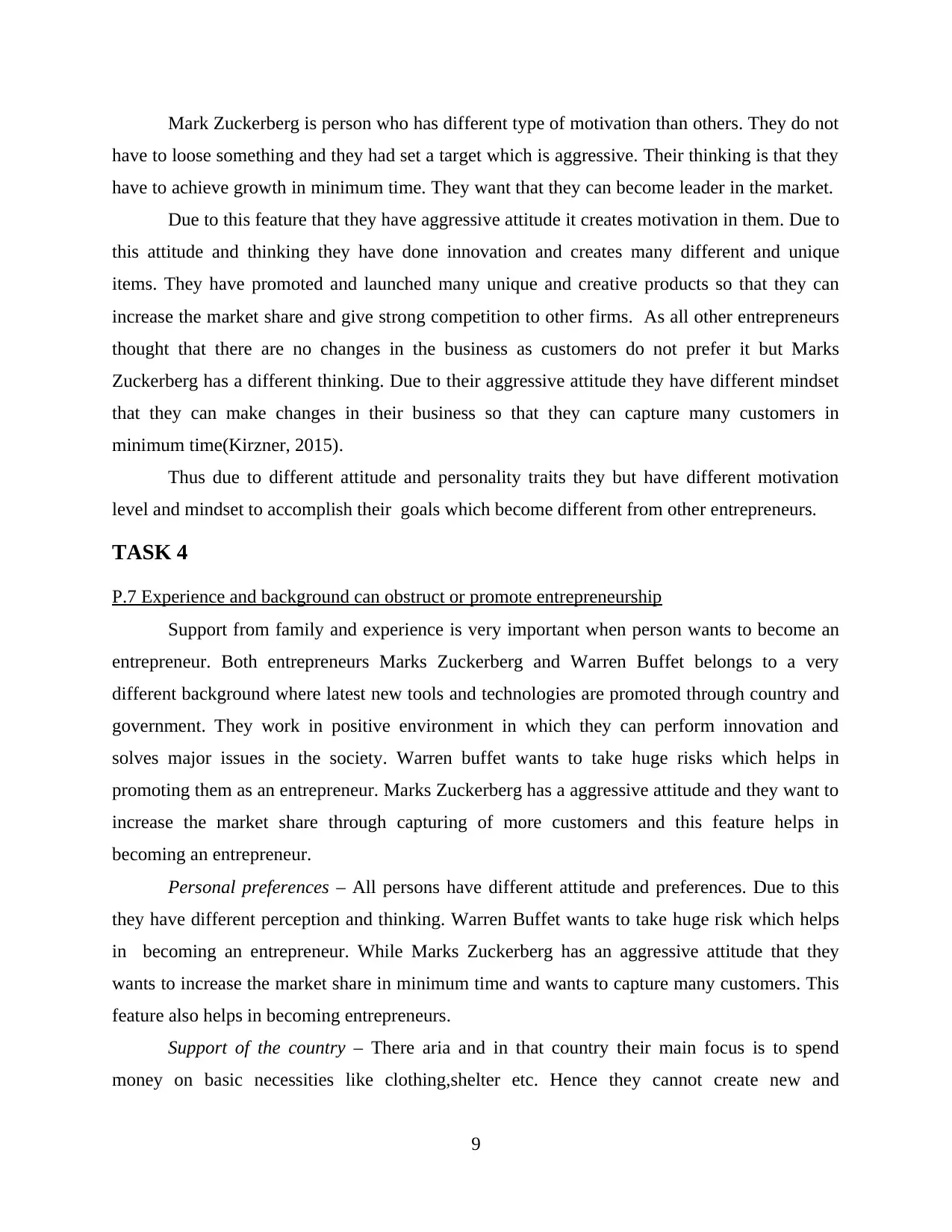
Mark Zuckerberg is person who has different type of motivation than others. They do not
have to loose something and they had set a target which is aggressive. Their thinking is that they
have to achieve growth in minimum time. They want that they can become leader in the market.
Due to this feature that they have aggressive attitude it creates motivation in them. Due to
this attitude and thinking they have done innovation and creates many different and unique
items. They have promoted and launched many unique and creative products so that they can
increase the market share and give strong competition to other firms. As all other entrepreneurs
thought that there are no changes in the business as customers do not prefer it but Marks
Zuckerberg has a different thinking. Due to their aggressive attitude they have different mindset
that they can make changes in their business so that they can capture many customers in
minimum time(Kirzner, 2015).
Thus due to different attitude and personality traits they but have different motivation
level and mindset to accomplish their goals which become different from other entrepreneurs.
TASK 4
P.7 Experience and background can obstruct or promote entrepreneurship
Support from family and experience is very important when person wants to become an
entrepreneur. Both entrepreneurs Marks Zuckerberg and Warren Buffet belongs to a very
different background where latest new tools and technologies are promoted through country and
government. They work in positive environment in which they can perform innovation and
solves major issues in the society. Warren buffet wants to take huge risks which helps in
promoting them as an entrepreneur. Marks Zuckerberg has a aggressive attitude and they want to
increase the market share through capturing of more customers and this feature helps in
becoming an entrepreneur.
Personal preferences – All persons have different attitude and preferences. Due to this
they have different perception and thinking. Warren Buffet wants to take huge risk which helps
in becoming an entrepreneur. While Marks Zuckerberg has an aggressive attitude that they
wants to increase the market share in minimum time and wants to capture many customers. This
feature also helps in becoming entrepreneurs.
Support of the country – There aria and in that country their main focus is to spend
money on basic necessities like clothing,shelter etc. Hence they cannot create new and
9
have to loose something and they had set a target which is aggressive. Their thinking is that they
have to achieve growth in minimum time. They want that they can become leader in the market.
Due to this feature that they have aggressive attitude it creates motivation in them. Due to
this attitude and thinking they have done innovation and creates many different and unique
items. They have promoted and launched many unique and creative products so that they can
increase the market share and give strong competition to other firms. As all other entrepreneurs
thought that there are no changes in the business as customers do not prefer it but Marks
Zuckerberg has a different thinking. Due to their aggressive attitude they have different mindset
that they can make changes in their business so that they can capture many customers in
minimum time(Kirzner, 2015).
Thus due to different attitude and personality traits they but have different motivation
level and mindset to accomplish their goals which become different from other entrepreneurs.
TASK 4
P.7 Experience and background can obstruct or promote entrepreneurship
Support from family and experience is very important when person wants to become an
entrepreneur. Both entrepreneurs Marks Zuckerberg and Warren Buffet belongs to a very
different background where latest new tools and technologies are promoted through country and
government. They work in positive environment in which they can perform innovation and
solves major issues in the society. Warren buffet wants to take huge risks which helps in
promoting them as an entrepreneur. Marks Zuckerberg has a aggressive attitude and they want to
increase the market share through capturing of more customers and this feature helps in
becoming an entrepreneur.
Personal preferences – All persons have different attitude and preferences. Due to this
they have different perception and thinking. Warren Buffet wants to take huge risk which helps
in becoming an entrepreneur. While Marks Zuckerberg has an aggressive attitude that they
wants to increase the market share in minimum time and wants to capture many customers. This
feature also helps in becoming entrepreneurs.
Support of the country – There aria and in that country their main focus is to spend
money on basic necessities like clothing,shelter etc. Hence they cannot create new and
9
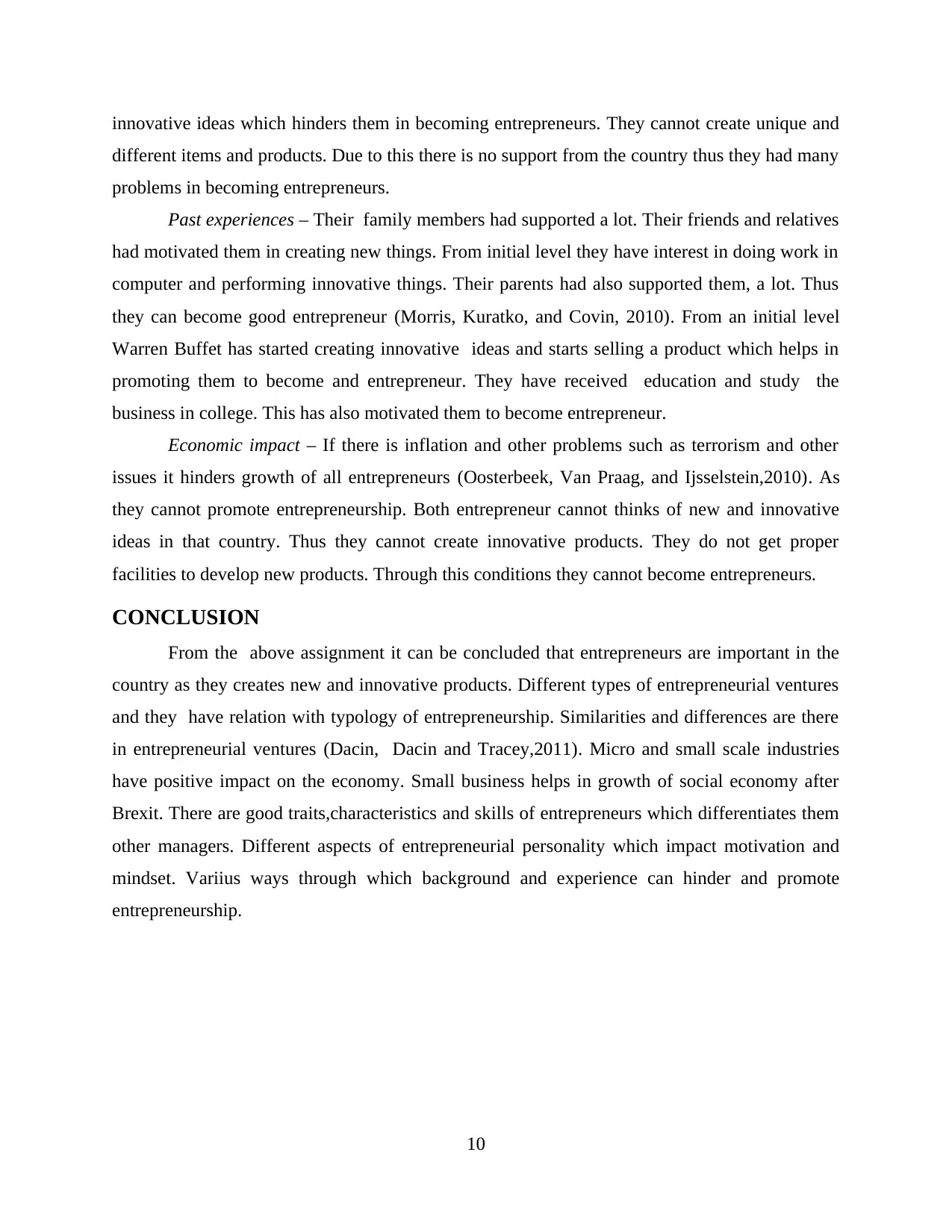
innovative ideas which hinders them in becoming entrepreneurs. They cannot create unique and
different items and products. Due to this there is no support from the country thus they had many
problems in becoming entrepreneurs.
Past experiences – Their family members had supported a lot. Their friends and relatives
had motivated them in creating new things. From initial level they have interest in doing work in
computer and performing innovative things. Their parents had also supported them, a lot. Thus
they can become good entrepreneur (Morris, Kuratko, and Covin, 2010). From an initial level
Warren Buffet has started creating innovative ideas and starts selling a product which helps in
promoting them to become and entrepreneur. They have received education and study the
business in college. This has also motivated them to become entrepreneur.
Economic impact – If there is inflation and other problems such as terrorism and other
issues it hinders growth of all entrepreneurs (Oosterbeek, Van Praag, and Ijsselstein,2010). As
they cannot promote entrepreneurship. Both entrepreneur cannot thinks of new and innovative
ideas in that country. Thus they cannot create innovative products. They do not get proper
facilities to develop new products. Through this conditions they cannot become entrepreneurs.
CONCLUSION
From the above assignment it can be concluded that entrepreneurs are important in the
country as they creates new and innovative products. Different types of entrepreneurial ventures
and they have relation with typology of entrepreneurship. Similarities and differences are there
in entrepreneurial ventures (Dacin, Dacin and Tracey,2011). Micro and small scale industries
have positive impact on the economy. Small business helps in growth of social economy after
Brexit. There are good traits,characteristics and skills of entrepreneurs which differentiates them
other managers. Different aspects of entrepreneurial personality which impact motivation and
mindset. Variius ways through which background and experience can hinder and promote
entrepreneurship.
10
different items and products. Due to this there is no support from the country thus they had many
problems in becoming entrepreneurs.
Past experiences – Their family members had supported a lot. Their friends and relatives
had motivated them in creating new things. From initial level they have interest in doing work in
computer and performing innovative things. Their parents had also supported them, a lot. Thus
they can become good entrepreneur (Morris, Kuratko, and Covin, 2010). From an initial level
Warren Buffet has started creating innovative ideas and starts selling a product which helps in
promoting them to become and entrepreneur. They have received education and study the
business in college. This has also motivated them to become entrepreneur.
Economic impact – If there is inflation and other problems such as terrorism and other
issues it hinders growth of all entrepreneurs (Oosterbeek, Van Praag, and Ijsselstein,2010). As
they cannot promote entrepreneurship. Both entrepreneur cannot thinks of new and innovative
ideas in that country. Thus they cannot create innovative products. They do not get proper
facilities to develop new products. Through this conditions they cannot become entrepreneurs.
CONCLUSION
From the above assignment it can be concluded that entrepreneurs are important in the
country as they creates new and innovative products. Different types of entrepreneurial ventures
and they have relation with typology of entrepreneurship. Similarities and differences are there
in entrepreneurial ventures (Dacin, Dacin and Tracey,2011). Micro and small scale industries
have positive impact on the economy. Small business helps in growth of social economy after
Brexit. There are good traits,characteristics and skills of entrepreneurs which differentiates them
other managers. Different aspects of entrepreneurial personality which impact motivation and
mindset. Variius ways through which background and experience can hinder and promote
entrepreneurship.
10
Paraphrase This Document
Need a fresh take? Get an instant paraphrase of this document with our AI Paraphraser
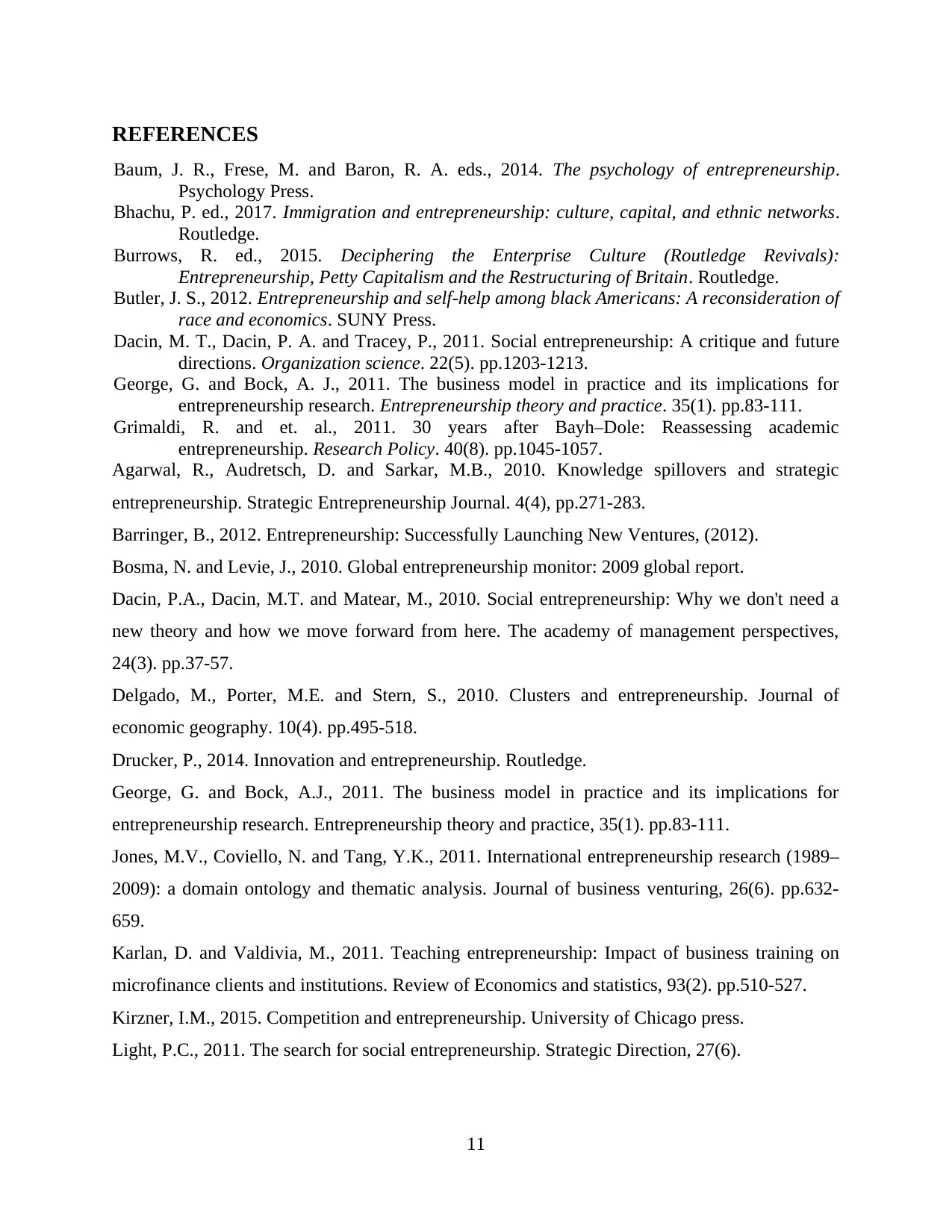
REFERENCES
Baum, J. R., Frese, M. and Baron, R. A. eds., 2014. The psychology of entrepreneurship.
Psychology Press.
Bhachu, P. ed., 2017. Immigration and entrepreneurship: culture, capital, and ethnic networks.
Routledge.
Burrows, R. ed., 2015. Deciphering the Enterprise Culture (Routledge Revivals):
Entrepreneurship, Petty Capitalism and the Restructuring of Britain. Routledge.
Butler, J. S., 2012. Entrepreneurship and self-help among black Americans: A reconsideration of
race and economics. SUNY Press.
Dacin, M. T., Dacin, P. A. and Tracey, P., 2011. Social entrepreneurship: A critique and future
directions. Organization science. 22(5). pp.1203-1213.
George, G. and Bock, A. J., 2011. The business model in practice and its implications for
entrepreneurship research. Entrepreneurship theory and practice. 35(1). pp.83-111.
Grimaldi, R. and et. al., 2011. 30 years after Bayh–Dole: Reassessing academic
entrepreneurship. Research Policy. 40(8). pp.1045-1057.
Agarwal, R., Audretsch, D. and Sarkar, M.B., 2010. Knowledge spillovers and strategic
entrepreneurship. Strategic Entrepreneurship Journal. 4(4), pp.271-283.
Barringer, B., 2012. Entrepreneurship: Successfully Launching New Ventures, (2012).
Bosma, N. and Levie, J., 2010. Global entrepreneurship monitor: 2009 global report.
Dacin, P.A., Dacin, M.T. and Matear, M., 2010. Social entrepreneurship: Why we don't need a
new theory and how we move forward from here. The academy of management perspectives,
24(3). pp.37-57.
Delgado, M., Porter, M.E. and Stern, S., 2010. Clusters and entrepreneurship. Journal of
economic geography. 10(4). pp.495-518.
Drucker, P., 2014. Innovation and entrepreneurship. Routledge.
George, G. and Bock, A.J., 2011. The business model in practice and its implications for
entrepreneurship research. Entrepreneurship theory and practice, 35(1). pp.83-111.
Jones, M.V., Coviello, N. and Tang, Y.K., 2011. International entrepreneurship research (1989–
2009): a domain ontology and thematic analysis. Journal of business venturing, 26(6). pp.632-
659.
Karlan, D. and Valdivia, M., 2011. Teaching entrepreneurship: Impact of business training on
microfinance clients and institutions. Review of Economics and statistics, 93(2). pp.510-527.
Kirzner, I.M., 2015. Competition and entrepreneurship. University of Chicago press.
Light, P.C., 2011. The search for social entrepreneurship. Strategic Direction, 27(6).
11
Baum, J. R., Frese, M. and Baron, R. A. eds., 2014. The psychology of entrepreneurship.
Psychology Press.
Bhachu, P. ed., 2017. Immigration and entrepreneurship: culture, capital, and ethnic networks.
Routledge.
Burrows, R. ed., 2015. Deciphering the Enterprise Culture (Routledge Revivals):
Entrepreneurship, Petty Capitalism and the Restructuring of Britain. Routledge.
Butler, J. S., 2012. Entrepreneurship and self-help among black Americans: A reconsideration of
race and economics. SUNY Press.
Dacin, M. T., Dacin, P. A. and Tracey, P., 2011. Social entrepreneurship: A critique and future
directions. Organization science. 22(5). pp.1203-1213.
George, G. and Bock, A. J., 2011. The business model in practice and its implications for
entrepreneurship research. Entrepreneurship theory and practice. 35(1). pp.83-111.
Grimaldi, R. and et. al., 2011. 30 years after Bayh–Dole: Reassessing academic
entrepreneurship. Research Policy. 40(8). pp.1045-1057.
Agarwal, R., Audretsch, D. and Sarkar, M.B., 2010. Knowledge spillovers and strategic
entrepreneurship. Strategic Entrepreneurship Journal. 4(4), pp.271-283.
Barringer, B., 2012. Entrepreneurship: Successfully Launching New Ventures, (2012).
Bosma, N. and Levie, J., 2010. Global entrepreneurship monitor: 2009 global report.
Dacin, P.A., Dacin, M.T. and Matear, M., 2010. Social entrepreneurship: Why we don't need a
new theory and how we move forward from here. The academy of management perspectives,
24(3). pp.37-57.
Delgado, M., Porter, M.E. and Stern, S., 2010. Clusters and entrepreneurship. Journal of
economic geography. 10(4). pp.495-518.
Drucker, P., 2014. Innovation and entrepreneurship. Routledge.
George, G. and Bock, A.J., 2011. The business model in practice and its implications for
entrepreneurship research. Entrepreneurship theory and practice, 35(1). pp.83-111.
Jones, M.V., Coviello, N. and Tang, Y.K., 2011. International entrepreneurship research (1989–
2009): a domain ontology and thematic analysis. Journal of business venturing, 26(6). pp.632-
659.
Karlan, D. and Valdivia, M., 2011. Teaching entrepreneurship: Impact of business training on
microfinance clients and institutions. Review of Economics and statistics, 93(2). pp.510-527.
Kirzner, I.M., 2015. Competition and entrepreneurship. University of Chicago press.
Light, P.C., 2011. The search for social entrepreneurship. Strategic Direction, 27(6).
11
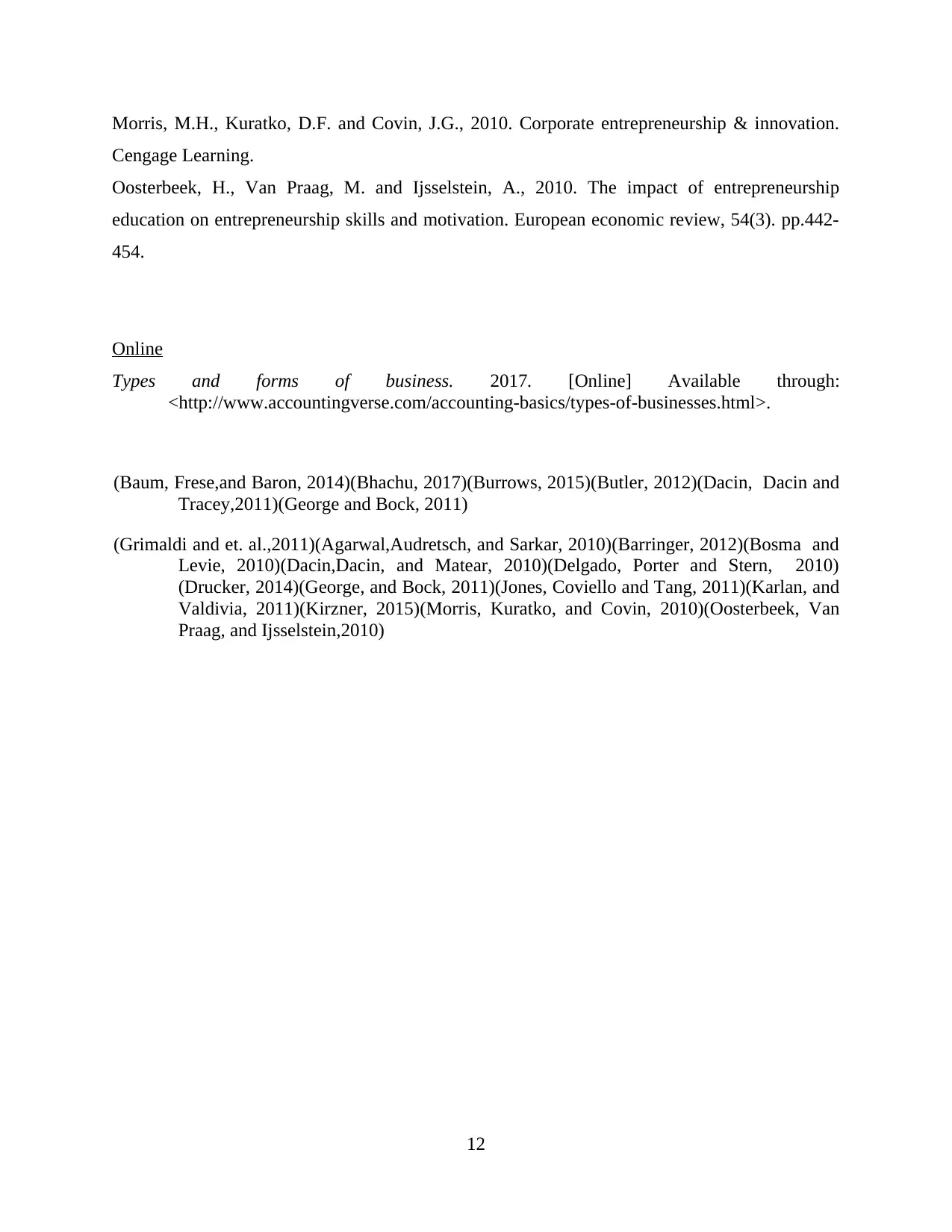
Morris, M.H., Kuratko, D.F. and Covin, J.G., 2010. Corporate entrepreneurship & innovation.
Cengage Learning.
Oosterbeek, H., Van Praag, M. and Ijsselstein, A., 2010. The impact of entrepreneurship
education on entrepreneurship skills and motivation. European economic review, 54(3). pp.442-
454.
Online
Types and forms of business. 2017. [Online] Available through:
<http://www.accountingverse.com/accounting-basics/types-of-businesses.html>.
(Baum, Frese,and Baron, 2014)(Bhachu, 2017)(Burrows, 2015)(Butler, 2012)(Dacin, Dacin and
Tracey,2011)(George and Bock, 2011)
(Grimaldi and et. al.,2011)(Agarwal,Audretsch, and Sarkar, 2010)(Barringer, 2012)(Bosma and
Levie, 2010)(Dacin,Dacin, and Matear, 2010)(Delgado, Porter and Stern, 2010)
(Drucker, 2014)(George, and Bock, 2011)(Jones, Coviello and Tang, 2011)(Karlan, and
Valdivia, 2011)(Kirzner, 2015)(Morris, Kuratko, and Covin, 2010)(Oosterbeek, Van
Praag, and Ijsselstein,2010)
12
Cengage Learning.
Oosterbeek, H., Van Praag, M. and Ijsselstein, A., 2010. The impact of entrepreneurship
education on entrepreneurship skills and motivation. European economic review, 54(3). pp.442-
454.
Online
Types and forms of business. 2017. [Online] Available through:
<http://www.accountingverse.com/accounting-basics/types-of-businesses.html>.
(Baum, Frese,and Baron, 2014)(Bhachu, 2017)(Burrows, 2015)(Butler, 2012)(Dacin, Dacin and
Tracey,2011)(George and Bock, 2011)
(Grimaldi and et. al.,2011)(Agarwal,Audretsch, and Sarkar, 2010)(Barringer, 2012)(Bosma and
Levie, 2010)(Dacin,Dacin, and Matear, 2010)(Delgado, Porter and Stern, 2010)
(Drucker, 2014)(George, and Bock, 2011)(Jones, Coviello and Tang, 2011)(Karlan, and
Valdivia, 2011)(Kirzner, 2015)(Morris, Kuratko, and Covin, 2010)(Oosterbeek, Van
Praag, and Ijsselstein,2010)
12
1 out of 15
Related Documents
Your All-in-One AI-Powered Toolkit for Academic Success.
+13062052269
info@desklib.com
Available 24*7 on WhatsApp / Email
![[object Object]](/_next/static/media/star-bottom.7253800d.svg)
Unlock your academic potential
© 2024 | Zucol Services PVT LTD | All rights reserved.





